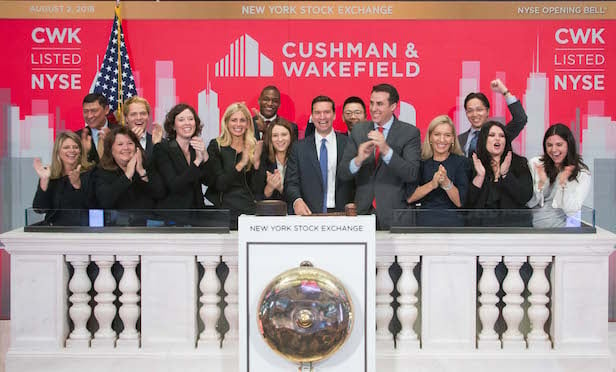
NEW YORK CITY—Cushman & Wakefield and its principal shareholders, TPG, PAG Asia Capital, and Ontario Teachers' Pension Plan Board, priced 45 million of its ordinary shares at $17 per share, listed on the New York Stock Exchange under the symbol “CWK” beginning Thurs., Aug. 2, 2018. In addition, C&W granted underwriters a 30-day option to purchase up to an additional 6.75 million ordinary shares at the public offering price, for $114.8 million.
The global real estate firm plans to use the IPO proceeds to reduce outstanding debt, repay its second lien loan, to pay amounts related to its acquisition of Cassidy Turley, and for general corporate purposes.
Concurrently, C&W sold a 4.9% ownership interest in the company to Vanke Service (HongKong) Co., Limited, a subsidiary of China Vanke Co., Ltd. With the IPO, a corporate restructuring of the company and its subsidiaries was undertaken, which resulted in a new English public limited company, Cushman & Wakefield plc, becoming the parent company of the group.
Morgan Stanley, J.P. Morgan, Goldman Sachs & Co. and UBS Investment Bank were joint book-running managers and representatives of the underwriters for the offering. The law firm Cleary Gottlieb represented C&W and its principal shareholders in the IPO and in the private placement investment by Vanke.
In announcing the IPO, C&W noted it has 48,000 employees in approximately 400 offices and 70 countries, and in 2017 had revenues of $6.9 billion.
The IPO makes the company worth approximately $3 billion, leaving the company $2.6 billion in debt. The Financial Times pointed out that the debt was enough of a worry to have it listed as a risk factor in the offering documents.
John Forrester, the president at Cushman & Wakefield, characterized the IPO as extremely successful. As previously reported in multiple publications, under TPG's ownership, C&W had been operating at a net loss for three years.
In January 2015, C&W acquired Massey & Knakal for $100 million and DTZ acquired Cassidy Turley. In September 2015, for $2 billion TPG and its partners acquired C&W, which in that same month completed a merger with DTZ. (In 2014, for $1.2 billion, the TPG group had acquired DTZ.)
Forrester tells Globest.com that the losses on the balance sheets reflect these consolidations. He says the costs resulted from the integration and bringing together of these offices, which has now been accomplished.
However, as first reported by MarketWatch, the S-1 registration statement filed with the SEC notes the company will not pay dividends on its ordinary shares. The document states, "All of our earnings in the foreseeable future will be used for the operation and growth of our business."
© Touchpoint Markets, All Rights Reserved. Request academic re-use from www.copyright.com. All other uses, submit a request to [email protected]. For more inforrmation visit Asset & Logo Licensing.







